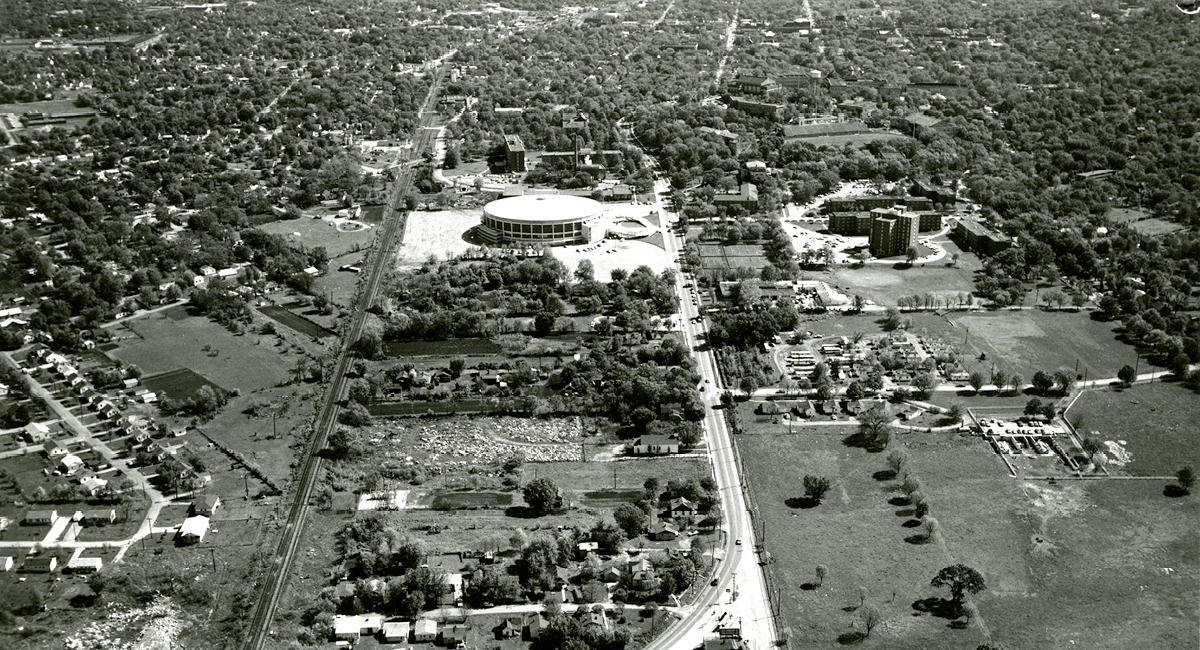
Jonesville
Honoring Jonesville: Our People, Our Community, Our Legacy
Jonesville was a tight-knit African American community in Bowling Green, Kentucky established around 1881 by formerly enslaved Blacks who fought for the Union during the Civil War. The 30-acre neighborhood was bordered by Dogwood Drive, Russellville Road, and the railroad tracks. Frame and hand-hewn stone houses lined the streets. By the 1960s, Jonesville was home to nearly 500 people and offered a haven with its own businesses, gathering places, and community traditions - from church on Sunday to crowded Friday night football games and weekly movie shows. As conveyed by Jonesville descendent Rev./Dr. Porter W. Bailey, "We had no keys to houses. We didn’t have to lock up cars. It was a very respectable neighborhood, and people respected you."
In the 1960s, the Jonesville neighborhood was acquired under the Urban Renewal Program to make way for the expansion of Western Kentucky University's campus. Initially, five Jonesville properties were deemed as “interfering” with the university’s expansion plans. When the owners of these properties declined to sell them to the University, condemnation proceedings were initiated. These proceedings continued with additional Jonesville properties. With their homes deemed “blighted,” for issues as minor as lacking sufficient off-street parking, many Jonesville residents were forced to leave their homes for a fraction of their properties’ values. Some were paid as little as $100. Now part of WKU’s campus, Jonesville lives on in the memories of the families who lived there and the efforts of community members. In 2021 and 2022, descendants, artists, folklorists, and historians began the Jonesville Memory Project to document, preserve, and share the stories of Jonesville.
This website shares history about the Jonesville community and efforts the University is implementing to honor Jonesville families and descendents.
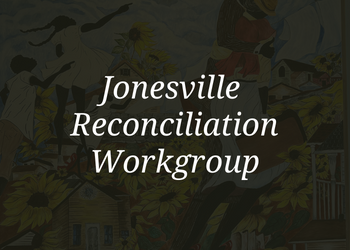
WKU President Timothy C. Caboni formed the Jonesville Reconciliation Workgroup in April 2022 with two primary charges. Learn more about the work of the committee.
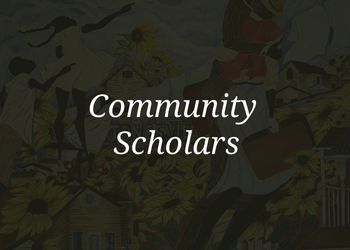
The Community Scholars Program is an ethnographic training course facilitated by the Kentucky Folklife Program and their partner the Kentucky Arts Council, part of the Department of Folk Studies and Anthropology.
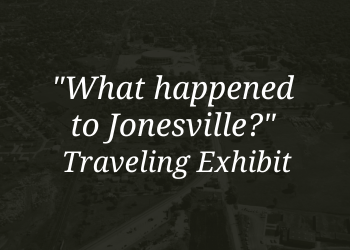
The Kentucky Museum now has "What happened to Jonesville?" as a traveling exhibit.
Community Scholars
In summer 2022, seven Southcentral Kentucky-based teams in the Community Scholars Program explored focused fieldwork research pertaining to Bowling Green, Kentucky's former Jonesville neighborhood. Participants are introduced to documentation techniques, ethics of working with communities, research and archiving methods, presentation of culture, grant writing and project development. They become part of a statewide Community Scholar network, promoting and advocating for traditional culture by sharing resources with local audiences, visiting tourists, teachers, students and other groups. The program is flexible in format and content, based on the trainees’ priorities and availability.
The Community Scholars Program is an ethnographic training course facilitated by the Kentucky Folklife Program and their partner the Kentucky Arts Council, part of the Department of Folk Studies and Anthropology, and provide a multi-week educational opportunity for Kentuckians interested in finding, documenting and presenting community culture, folklife and traditional arts. Over the past 22 years the Community Scholars Program has certified over 250 scholars exploring their own local culture around the Commonwealth. This research, based on intimate oral interviews with former residents of Jonesville and their descendents (whose lives have been profoundly affected by the neighborhood’s demolition) formed the body of this interpretive exhibit through the intimate voices of these residents and families dispossessed of their homes. Read more.
Jonesville Mural
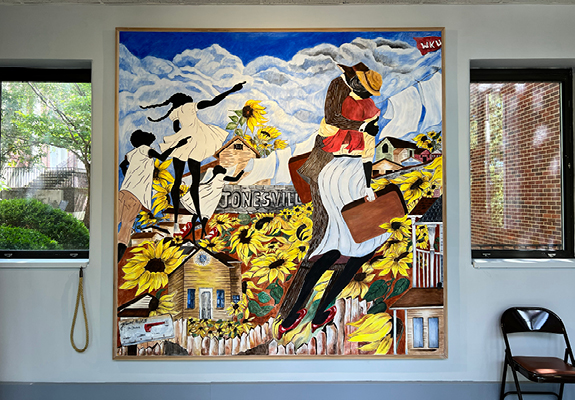
Local artist Alice Gatewood Waddell and WKU professor and artist Mike Nichols collaborated on a buon fresco mural commemorating Bowling Green’s Jonesville community. Supported by a grant from the E. Rhodes and Leona B. Carpenter Foundation, the mural provided internships for three WKU students – Aisha Salifu, Cecilia Morris, and Riley O’Loane – who worked alongside Waddell and Nichols to make the vision come to life. The technique used – fresco painting – is notable for its permanence. Used through history to enhance architecture, fresco fuses paint and stone together and has been used since Ancient Roman times.
Jonesville Timeline
Information provided by the Kentucky Museum
1881
The earliest known land deed for Jonesville traces back to 1881.
May 7, 1957
The Western Kentucky University (WKU) Board of Regents (BOR) identified five privately owned parcels of land that interfered with campus expansion. Properties are owned by Mrs. Ida Belle Johnson, Mr. Will Taylor, Mr. Harry Taylor, Mrs. Ellen Taylor Alexander, and Mrs. Lennie Cox.
July 6, 1957
WKU’s attorney sends notice to the five property owners (i.e., Mrs. Belle Johnson, Mr. W. Taylor, Mr. H. Taylor, Mrs. Taylor Alexander, Mrs. Cox). In summary, each property owner refused to consider selling their property to WKU. Representatives of the University preferred to purchase the property privately; however, the Board of Regents authorized the start of condemnation proceedings. This led to a final opportunity for property owners to contact WKU President Kelly Thompson or the attorney’s office before suits were filed.
- July 22, 1957 – Condemnation suits are filed;
- August 1, 1957 – Report of the Commission is filed;
- August 9, 1957 – WKU employs a law firm, has the five properties assessed at $52,305, and a hearing is set for September (1957);
- September 5, 1957 – Commissioners Report is accepted;
- September 19, 1957 – Properties are purchased by WKU and set to be vacated by November 15th (1957);
- April 5, 1958 – Condemnation proceedings are carried out.
November/December 1960
More condemnation proceedings are carried out on four properties.
December 13, 1960
Regents Minutes – “Proposed purchase of 7 parcels of land on west side of Russellville Road. Will try to negotiate first; get condemned if necessary.”
August 25, 1963
Approval expected soon for Jonesville Renewal Project – 34.7 acres; all buildings will be cleared except for an electric substation. Owners will qualify for special government loans (e.g., $200 closing costs, low interest 40 years) to purchase other property. Up to $10,500. Bit behind schedule which calls for land purchase to be completed by Feb. 1, 1965; re-location completed by April 1, 1965; site clearance completed by June 1, 1965.
September 24, 1963
About 125 present, mostly from Jonesville. Dr. E.T. Buford, Principal of High Street High School, presided. He spoke in favor of the program(?), commenting that he was disturbed by the "gobbling up of property by the College, piece by piece." Mr. M.M. Blewitt was first and stated, "Rev. Taylor's comments were very disturbing to the Commission"; 3 to 4 others from Jonesville spoke against it.
Oct. 2, 1963
J.H. Taylor Protests: "We cannot and will not accept such a plan." Must call in the NAACP (National Association for the Advancement of Colored People), CORE (Congress of Racial Equality), and Southern Christian Leadership, and go into the federal courts.
October 2, 1963
Letter to Editor of Park City Daily News by Rev. J. H. Taylor, states about Jonesville, “Last week a meeting of the Urban Renewal Committee was held at the McNeill School. In this meeting several men spoke in the interest of urban renewal and tried to paint a picture of the program’s help for Bowling Green, even though they know that it is one of the worst programs ever suggested for our city. They were for the program because they are all getting or expecting to get some personal benefit or other out of it. Several of those speaking in favor of the program are on the payroll, some drawing $7,000 a year and others $9,000 a year.” […] “They made known their intentions to buy our homes, whether we wanted to sell or not, and stated publicly that they have no intentions of paying us enough to buy or build without incurring indebtedness. They said we could borrow the money to rebuilt, or rent from them.” […] “They refused to offer any solution to the fact that 14 widows of the community would be put out of homes and cannot qualify for a loan when they are moved out. Nor can my church qualify for a loan to rebuild.”
December 2, 1963
Final approval for the project is granted.
February 15, 1964
Record of Hearing, Committee of Warren County Planning and Zoning Commission, February 15, 1964 (Saturday), 11:00 AM - Proposed Development Plan for WKU. President Thompson discussed "dire need" for more space. Will need lab school, new stadium, and combined Agri-Demonstration Building. Only area suitable is Jonesville Urban Renewal Project area. Student housing needed. Trade School and tennis courts will be removed. Rev. J.H. Taylor wanted to know how long before this project would be executed? Purchases would begin at once. Mr. Blewitt - plans were "premature," college would not grow that much. WKU needed to remove some of its own "junky buildings." Said Urban Renewal wasn't needed in Jonesville, that only purpose was "negro removal." Would take Supreme Court directive to make him obey. President Thompson denies this. Dean of Admissions, Dr. J.T. Gilbert, Owen Lawson testified.
March 9, 1964
Form letter from Rev. J.H. Taylor, March 9, 1964 - Name to be filled in. Asks people to vote against order. "We have no objection to selling our property to the State for the college, if the college need [sic] the property. But we want to deal directly with the State, and not have the urban renewal as a middle man, to take some of the prophet [sic] that should be ours. The State has bought property from us before, and have had no trouble at all in buying this property, and they will have no trouble in the future, if we can deal directly with them. "We have twelve widows in our community, drawing a small Secias [sic] security check, that is two [sic] small for them to get a loan to help them rebuild, under the urban renewal they would not get enough to buy another home, so they would be put out doors."
March 17, 1964
Courier-Journal reports on City Council meeting that advances renewal. Over 300 are in attendance (“overflow crowd”). After two hours of discussion, the Council gave final approval. The news report indicated that “The college has 35 acres of undeveloped land south of 17th street, and seven acres undeveloped north of the thoroughfare.”
March 18, 1964
March 18, 1964 article supporting Urban Renewal states, “…a victory for that part of Bowling Green’s citizenry that believes the community’s progress and the public welfare will be served by properly planned projects designed to renew certain older portions of the city.”
Jan 5, 1965
January 5, 1965 Letter to Editor of Daily News by Rev. J. H. Taylor: “The city of Bowling Green, with its Urban Renewal project and several Negroes who do not live in our community, and certainly have no heart for the people, joining together to take from us our homes bought and paid for with our blood, sweat and tears. […] Many of those who have had to sell have come out on the losing side. When the mortgage was paid, they did not have enough to buy a lot, much less a new home.”
Jan. 19, 1965
January 19, 1965 - The Urban Renewal Commission is going to start condemnation proceedings on 4-5 parcels. "I told them that if in their opinion this was the best course of action, we were in full agreement." WKU would not become "actively engaged" in land acquisition.
April 16, 1965
April 16, 1965 Letter to Editor of Daily News from C.L. White, a student at St. Maur’s Seminary at South Union – “Perhaps some people do not see the problems for it is a proven fact that seeing is extremely difficult if one closes his eyes to the facts….” / “we might look at the low prices being offered to friends in the Jonesville area, providing these people with great problems of housing and subsistence, so that a great football stadium might be erected in the community. (No doubt this would be a beautiful landmark for the community, but do you beautify a city by stepping on the already downtrodden citizens?)”
August 10, 1966
First Jonesville land bought – 8.05 acres
1966
The last property of Jonesville – the Mt. Zion Baptist Church – is sold.
1967
Mt. Zion Baptist Church building is destroyed, signifying the end of Jonesville. A new Mt. Zion Church was later built elsewhere in the city.
1977
1977 quote from President Thompson: “We had just about as many people in Jonesville who came to us wanting to be sure that they could sell their property as we had who were reluctant to sell, by the time it was finished. We did not use right of eminent domain at any point. One by one, when the rumors were dispelled that we, you know, were going to take over and the people would have no place to go - I think the factor that worked best to the solution of the problem was every time somebody would want to sell a piece of property we'd have it appraised, and we bought it. And they were fortunate enough and we were fortunate enough, that in each case they went somewhere else to buy, they were well satisfied with the financial swap which had occurred.”
1977 - present
Jonesville descendents and others work to preserve the history of the community. This
includes the Jonesville marker being established on WKU's campus, interviews with
former residents, and a Jonesville paper written by Maxine Ray.
2020 - 2021
In the fall of 2020, WKU President Timothy C. Caboni established the Naming and Symbols Task Force to conduct a thorough examination of the history of WKU’s namings; explore options for how WKU might address those that might be problematic, and make recommendations for university leadership to consider. In 2021, the Task Force report included recommendations pertaining to Jonesville.
2022
In his response to the Naming and Symbol Task Force recommendation, WKU President Caboni acknowledges plans to establish a Jonesville Reconciliation Working Group: "We will establish a working group to appropriately address the issues that remain from the dismantling of the Jonesville neighborhood."
In 2022, President Caboni appoints WKU faculty and staff along with community members that are descendents of Jonesville to serve on the Jonesville Reconciliation Workgroup.
Some of the links on this page may require additional software to view.

